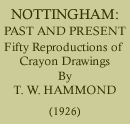< Previous | Contents | Next >
NOTTINGHAM PAST & PRESENT: NOTED BUILDINGS
THE MANOR HOUSE, Sneinton, 1890

This fine old brick building of three stories with its attractive gables was once surrounded by a large courtyard. It stood in a large park well stocked with deer and from its commanding position on the rock overhanging the Sneinton Hermitage it overlooked a wonderful stretch of country. Its outlook included the Trent valley from the Lincoln to the Leicestershire hills and it must have been a very delectable residence before modern industrialism blotted out its view.
Within this house lived Samuel Morley whose statue occupies so prominent a place at the top of Market Street. Samuel Morley, born in 1809, was an astute and honourable man; he controlled the great business that bears his name and is known throughout the world; he refused a peerage, and died a commoner in 1886. His almost innumerable acts of philanthropy have kept his memory green, one of these is particularly worthy of recall. Long before pensions for the aged were thought of by the generality of employers or by the official classes, Mr. Morley allowed his aged workpeople a pension of six shillings per week—a very comfortable sum in those days—and even to-day we hear, when talking to old people, some faint echo of the joy that this generous action brought into many a humble home.
The name of Sneinton is interesting because it begins with the letter 'S'. The ancient name of Nottingham was 'Snotingham', meaning the 'ham' or homestead of the followers of Snot; who Snot was we do not know but his unpleasant name has come down to us in the fairly common patronymic of 'Snow'. In addition to their 'ham' or main settlement, these followers of Snot established a 'ton' or enclosure which went by the name of 'Snotington'; Snotingham became important while Snoting-ton remained obscure. Then came the Normans who found it difficult to pronounce the initial 'S', so they dropped it from the name of the important Snotingham which was thenceforth known as 'Nottingham', but it was retained in the unimportant Snotington with which the Normans had little to do and which has gradually through the course of ages become shortened into 'Sneinton'. There still remains a street—with extremely interesting associations, for in it General Booth was born—which bears in its name 'Notintone Place' some faint indication of the origin and meaning of the name of Sneinton.
